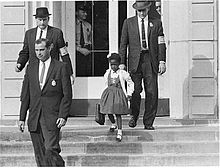 I had plans for last Wednesday.
I had plans for last Wednesday.
We’ve been studying historical fiction and I was planning to teach my fourth graders about Ruby Bridges. I was going to have them write an historical fiction piece about her first day at school. But as I was getting ready for school, my voice of reason reconsidered. Somehow the idea of telling my diverse group of students about a six-year-old girl who endured a storm of racial epithets didn’t seem appropriate after what happened Tuesday night.
But another part of my mind pushed back. I could have pointed out that Ruby had every right to be at that school even though she didn’t feel welcome. I could have explained that American citizenship doesn’t have degrees; the Muslim kid in my class who was born two months after his parents fled Libya is just as American as his 55-year-old teacher who’s a direct descendant from a Jamestown settler.
I could have pointed out that Ruby had her classroom to herself. None of the other families wanted their children to study with her. Many of them left the school altogether, not unlike what will happen when the Department of Education begins to push for “School Choice,” a thin veil for a voucher system, sold as way for poor families to enroll their children in private schools. In reality, of course, the only beneficiaries are those families who are not only able to transport their kids to private schools, but affluent enough to make up the difference between their vouchers and private school tuition.
I could have pointed out that only one teacher in Ruby’s new school would agree to teach her. I could have shared how teachers aren’t perfect. Like most humans, they can be petulant and small. Even now, we can sometimes dispense with restraint and politesse and gripe about the amount of resources we pour into our ELL programs or the lack of Christmas carols during the Winter Concert. And while it’s one thing to notice that our Hi-Cap programs, honors classes and high school orchestras are dominated by Asian Americans, it’s another thing altogether to complain about it. I could have warned my students that restraint and politesse will probably be in decline throughout the near future, even in their teachers.
I could have done all these things, but I didn’t. On Wednesday my kids were stunned. Some were terrified. Their families came from virtually everywhere: Mexico, El Salvador, Columbia, Ukraine, Libya, Eretria, Ethiopia, Bangladesh, Cambodia, Vietnam and Korea. They may have come to America for economic opportunity, but they came to our community because they feel welcome. Now they aren’t so sure.
I didn’t teach them about Ruby Bridges. I couldn’t. Instead I taught them about the Pig War and let them write historical fiction pieces about that. The Pig War, I explained, was a stupid little event in which American and English settlers on San Juan Island weren’t getting along very well and nearly took up arms after an American farmer shot an English pig that wandered into his yard. (In an irony lost on my students, it was President James Buchanan that smoothed things over and prevented the actual war.)
They had fun with their stories and it was just the distraction we needed. And although I told them the Pig War happened in 1859, I didn’t tell them it happened one year before an election that was more divisive than one we just endured.
Nor did I tell them what happened after that election, which was way worse than anything Ruby Bridges endured.
Tom, you always find a way. Thank you for teaching and sharing with us your classroom that is always based around love and compassion!